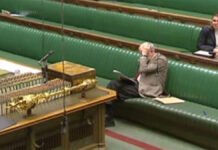In the first of our Book Reviews, Alex Mair looks at Chris Williamson’s Ten Years Hard Labour.
On Thursday 8 June 2017, Chris Williamson was returned to parliament as the Labour MP for Derby North. With most of the pollsters and mainstream media predicting an electoral wipe out for the Labour Party, Chris Williamson, like many Labour politicians, exceeded expectations. Williamson turned a voting deficit of 41 into a majority of 2,015. He stood on a proudly socialist platform, as the ‘most loyal Corbyn supporter in parliament’, and possibly the only vegan former bricklayer socialist MP. When Chris was returned to parliament, ousting the sitting Tory MP in the process, he saw the unravelling of the Corbyn project resulting in the disaster of the 2019 general election. Ten Years Hard Labour is his account of what went wrong.
Three and a half years since the project’s demise, there is already a growing body of literature about the Corbyn years. There are worthy additions (in particular Len McCluskey’s Always Red and Oliver Eagleton’s The Starmer Project being two of the best) as well as the trite and the silly (take a bow, Owen Jones’s This Land) as well as the more reflective and speculative contributions (I’m thinking of Andrew Murray’s Is Corbynism Possible? Here). Seamus Milne, it is rumoured, kept a diary during the Corbyn years. We still have no idea if this rumour is true, or if it will ever be published, but if it were to be, it would make indispensable reading for socialists. The body of work about the history of left politics in Britain between 2015 and 2019 is growing, but such a body of work would be redundant without Ten Years Hard Labour.
Williamson’s account of the Corbyn movement can be roughly divided into two parts, the insurgent rise from 2015-2017, culminating in the general election of 2017, and the slow motion unravelling of the movement from 2017-2019. After the insipid leader of Ed Miliband, Williamson is excited and energised by the prospect of a Corbyn government, which at the time, looked like a genuine possibility. But the project unravelled, and Williamson locates one of its failures – indeed, arguably its main failure – in the party’s inability, or unwillingness, to robustly defend itself and its history of anti-racist politics to a hostile media.
Williamson robustly defended the Labour Party, and Jeremy Corbyn, from the ludicrous accusation that there was ever any kind of institutional antisemitism in the Labour Party. For this, Williamson was pilloried by actors both without and within his party, including by some voices on the so-called radical left. The book is filled with examples of the kind of scurrilous abuse that was levelled at Williamson as the antisemitism hoax reached increasingly shrill levels of hysteria. He is repeatedly called a ‘crank’. One Labour MP jokes about assassinating him on the PLP WhatsApp group. When this MP is challenged about this appalling remark, she doubles down on her assassination fantasy. Labour grandee Roy Hattersley appears to make a bizarre Walter Mitty-esque story about meeting Williamson near Sheffield, a meeting which Williamson says never took place. Another MP describes him as a ‘cunt’ to a prominent journalist. I have spared you the weird ones.
Sadly Jeremy Corbyn, a good and decent man, failed to come to the aid of his most loyal parliamentary supporter. One of the aspects I respect most about the book is that it is very honest about the tactical blunders made by Jeremy Corbyn and John McDonnell. This book is neither a hagiography nor an apologia. Corbyn and McDonnell, both admirable politicians, are not spared criticism. If the pair failed to robustly call out the antisemitism slurs for what they really were, a hoax, then the second biggest blunder came in 2018.
At the 2018 autumn conference, the leader’s office requested that the Labour Party’s largest backer, Unite, back down from a motion introducing mandatory reselection, the mechanism for holding MPs to account by the membership, was introduced into the party rules. As instrumental politics goes, this was the most catastrophic mistake that Corbyn and McDonnell made during their tenure in charge of the Labour Party. With the threat of any kind of accountability now safely off the table, the PLP felt free to ramp up the mudslinging to hysterical levels. Newly emboldened by the knowledge that the leader’s office would blink when it came to the crunch, the antisemitism slurs became deafening.
There are lots of lessons for socialists to take from Ten Years Hard Labour. Perhaps the main one is this; the argument that the Labour Party can be transformed into a vehicle for genuine radical social change, is obsolete. It’s difficult not to conclude that the right-wing entryism that began under Neil Kinnock, is too far gone. The Labour Party’s institutions, committees and process have been captured by neo-liberals The party has been subjected to too much right-wing entryism for too long, and to put it simply, the Labour Party is now too far gone, and is now irretrievable. It may yet win elections in the future, but the prospect of even mild social democratic change is impossible. The right-wing drift is irreversible.
Sadly for those socialists like Chris Wiliamson, who gave the better part of their lives to the Labour Party, the party they once venerated seems lost as a force for good. The nineteenth century notion that simply voting for a socialist politician to attend a giant committee in Westminster, and thereby through some kind of magical, alchemical process, socialism will be achieved by parliamentary means, is over. The lesson of Ten Years Hard Labour is that new mass popular movements must be formed, new democratic institutions must be fought for and established, however difficult and laborious that process is.
Reviewed by Alex Mair

Alex is a writer based in West Yorkshire. Yorkshire is the place where he has spent the majority of his working life. He has written for a variety of publications for over ten years. His first book for children is due to be published in 2022. He lives with Rosie and one child from her previous relationship.
To order Ten Years Hard Labour by Chris Williamson at Amazon Books click the link
Support Independent Journalism Today
Our unwavering dedication is to provide you with unbiased news, diverse perspectives, and insightful opinions. We're on a mission to ensure that those in positions of power are held accountable for their actions, but we can't do it alone. Labour Heartlands is primarily funded by me, Paul Knaggs, and by the generous contributions of readers like you. Your donations keep us going and help us uphold the principles of independent journalism. Join us in our quest for truth, transparency, and accountability – donate today and be a part of our mission!
Like everyone else, we're facing challenges, and we need your help to stay online and continue providing crucial journalism. Every contribution, no matter how small, goes a long way in helping us thrive. By becoming one of our donors, you become a vital part of our mission to uncover the truth and uphold the values of democracy.
While we maintain our independence from political affiliations, we stand united against corruption, injustice, and the erosion of free speech, truth, and democracy. We believe in the power of accurate information in a democracy, and we consider facts non-negotiable.
Your support, no matter the amount, can make a significant impact. Together, we can make a difference and continue our journey toward a more informed and just society.
Thank you for supporting Labour Heartlands












